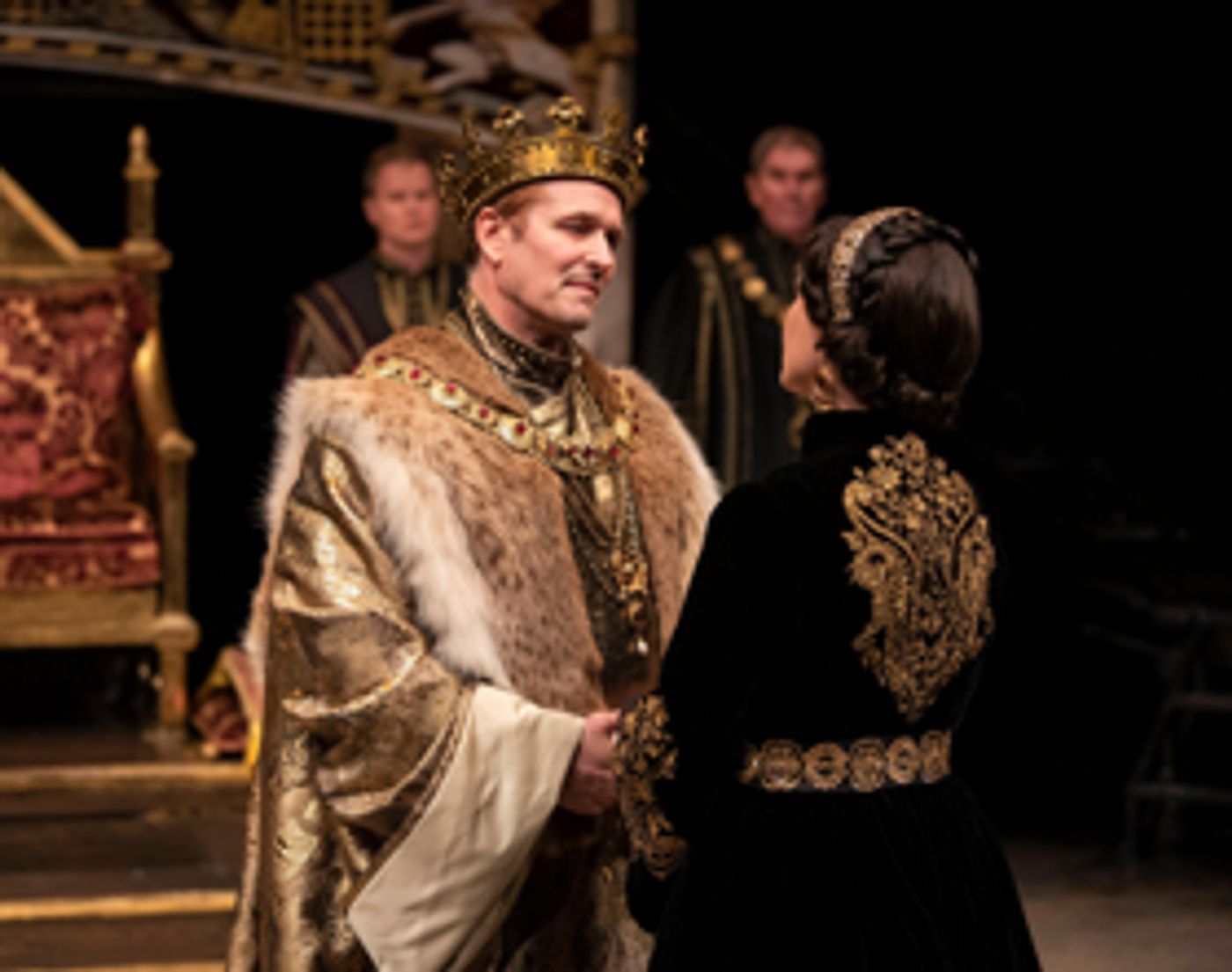Review: The Stratford Festival 's HENRY VIII Dazzles at the Studio Theatre

The Stratford Festival of Ontario may be known first and foremost for mounting productions of Shakespeare's plays, but there are certain plays by the bard that only seem to come around once in a while. For example, HENRY VIII, a play written by William Shakespeare and John Fletcher, has only been performed three other times in the history of the Stratford Festival--the last one being in 2004. This season, director Martha Henry has created a production of this play that feels relevant and exciting. Stunning performances by Jonathan Goad and Irene Poole elevate it event further.
One reason HENRY VIII is perhaps not as frequently done is because it is hard to get a full grasp of what kind of play it is. It isn't a comedy or a tragedy, but it is strange to call it a history because Shakespeare's histories are typically known for their battle scenes-of which this production has a total of none. The battles are within politics and manipulation in this play-which is certainly relevant to the political climate today. Perhaps the most interesting aspect of this story, and likely what is most memorable about Henry VIII the man, are the women in his life. We only see him marry two of them in this play, but the knowledge of what happens to each of his wives certainly affects how the audience views this section of his story.
This play focuses particularly on Henry's first wife, Katherine of Aragon (played by the alluring Irene Poole) whom he was married to for 24 years. Henry's production does well to really delve into Katherine's scenes and allow the audience to truly see the events surrounding the dissolution of her marriage from her perspective. This play is such a strong depiction of the patriarchy in action, with the men having all the power and influence and the women quite literally being seen as impositions. It also depicts the influence a leader's advisors can have, as much of the play sees Henry being manipulated by Cardinal Wolsey (Rod Beattie). With Wolsey convincing Henry that his marriage is illegal, and Henry falling for the youthful Anne Boleyn, who is far more likely to produce him a male heir, he chooses to end his marriage with Katherine. Although Henry, regardless of how genuine his love might be for these women, clearly sees them as property, the play itself does not. We see Katherine's devastation over being thrown aside, and Anne's excitement but also guilt over being the other woman. I found myself leaning in to see what would happen when these women shared a scene-not because I wanted to see a Shakespearean cat fight, but because these are two multifaceted characters who have found themselves in an impossible situation. The scene does not disappoint, as we have a moment where Katherine asks her handmaidens play her music and as Anne sings, she stands right behind her, staring at the back of her neck. She knows. And Anne knows she knows. This moment is as tense as when Henry draws his knife later in the play.
It is very exciting that Poole will be playing this same character in Kate Hennig's MOTHER'S DAUGHTER later this season. This decision to pair these two plays and have the same actress play this role was nothing short of ingenious.
As Henry, Jonathan Goad shines (sometimes quite literally, as the costumes by designer Francesca Callow are exquisitely regal). When the play begins, he is fickle and easily influenced by others, and by the end, he more self-actualized and unwilling to allow unfounded rumours dictate his decisions. King Henry changes his advisors almost as frequently as he changes his wives. There are several instances where information is revealed about a character-sometimes true, sometimes not-which leads to them losing their power and position of authority almost immediately. This too, seems all too relevant in today's "cancellation culture." Goad portrays Henry's restlessness and desire for change in a way where audiences do root for him to make the right decisions. Henry does not get his male heir, but does fall madly in love with his newborn daughter, the future queen, Elizabeth. It is somewhat ironic that this play is spent treating women as property and pawns, only to end with a raucous celebration for the then most powerful woman in England.
As the play ends, and the characters celebrate Elizabeth I's birth, and her future, I imagined what this must have been like when this play was first performed and that baby they were celebrating was the current Queen of England. I then looked up and saw that the projection of Elizabeth I that was featured on stage, had morphed into the image of our current Queen, Elizabeth II, and I suddenly got a small taste of that sense of patriotism.
Other standout performances in this production include Kim Horsman as the Duchess of Norfolk, Ron Kennell as Cardinal Campelus (great costume) and Brad Hodder as Canmer, Archbishop of Canterbury.
The design by Francesca Callow and original music by Keith Thomas, with music direction by Franklin Brasz work well to transport the audience into this world. The intimate staging at the Studio Theatre also works very well.
HENRY VIII may not be as flashy as some of Shakespeare's better known works, but excellent performances in an intimate space, with stunning design, certainly make it a play worth doing...and a play worth seeing.
HENRY VIII continues in repertory at the Studio Theatre until October 20th.
Photo Credit: Emily Cooper
Reader Reviews
Videos

